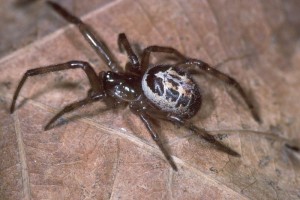False Black Widow Spiders: Killer Spiders in the UK?
False Black Widow spiders: cause for concern?
I heard on the news recently that we are being warned of a large influx of spiders into our homes this autumn. I’m not sure my house can fit any more in! Although they do appear to be larger this year. There was also a report of a young girl who had been bitten by a False Black Widow and had a nasty reaction. Should we be scared?
Absolutely not
Among the approximately 600 spiders in the UK, non are deadly, although some can give a nip if poked, threatened or sat on. All spiders are venomous but only around 6 species can actually pierce the human skin. Deaths from spiders in the UK still rests around the zero mark. However, these facts do little to placate the hardiest among us, their perceived threat setting off all manner of phobic symptoms like sweaty hands, screaming, hairs standing up at the back of your neck, the shivers, beating Usain Bolt to the nearest exit….. These tiny little creatures can create fear of certain annihilation in the biggest of human brutes. Yet why?
Evolutionary Responses
One of the reasons we are said to have phobic responses to creatures such as spiders, snakes and scorpions is due to evolutionary influences. It made sense to stay away from such critters in the days of the caveman in order to prolong life, particularly as the UK was part of Pangea many eons ago. And those who sadly were bitten and died, well, often their genes didn’t get to widen the gene pool.
Our Well-Intentioned Care Givers
Phobic reactions can also be started by our care-givers. Parents unwittingly pass on their fear to their children. When Mum screams as she runs through the house desperately pulling off her jumper because a spider was on her shoulder, it has an impact on the children. Or when Dad dives under the kitchen table at the first roll of thunder. Even when we try our very hardest to not react to something we fear, often our little ones pick it up subconsciously and so the phobia gets passed down from one generation to the next.
UK’s Most Venomous Spider
Hailed as the UK’s most venomous spider, sightings of the False Widow Spider are continuing to climb among the population of the UK. Global warming is said to have led to a preponderance of these small arachnids.
The Sciency Bit
A member of the genus Steatoda, the False Black Widow spider’s Latin name is Steatoda nobilis. The reason it is called the False Black Widow spider is because of its round, bulbous body, which is similar to that of the Black Widow, which in fact belongs to a different genus (Lactrodectus), but is of the same family as the False Black Widow (Theridiidae). The female abdomen is more dome shaped than that of the male which is slightly thinner. The False Black Widow spider is not native to the UK, but is thought to have been introduced in the late 1870s into the south of England. It was first recorded in Torquay in 1879. The average body length of a female False Widow is 14mm; that of the male is 10mm. Fairly small really given that it has quite an impressive name!
Where are False Black Widow spiders found?
False Widows often live in cracks of walls and in the bark of trees. They construct a web of irregular tangles which is usually found in a crevice. They have poor eyesight and usually rely upon the vibrations of prey on its web to let them know of a tasty snack or approaching danger. So don’t poke their nest! The False Black Widow spider is not an aggressive spider and is sedentary in nature, preferring to remain within its web. It is the male only who tends to roam when he is mature and looking for a mate.
False Black Widow Bite
Being bitten is likely to be the unfortunate result of either poking the web or sitting or lying inadvertently on a spider. It is thought that the bite is rarely felt, rather it is the reaction to the bite which consists of a burning sensation to the area. Within 20 minutes or so swelling will occur and a weal will develop. It is thought that, as with bees, some people may have an allergic reaction to the venom, and in the case of severe swelling and/or ulceration, medical advice should be sought. The effect of the bite on non-allergic and healthy people is unlikely to be worse than a bee or a wasp sting. Indeed, in the UK, more people become seriously ill from allergic reactions to bees and wasps than ever they do from a spider bite. A spider’s bite is defensive, so live and let live.
Hypnosis for spider phobia
I treat many people for spider phobias. I too was afraid of them once upon a time, but since one session of hypnosis I find them totally mesmerizing now. I don’t pick up the large ones with my bare hands, but gather them up carefully in a soft rag and put them outside. The smaller ones don’t bother me at all and I’m happy to leave the spiders to roam around in the house. I have since become very interested in photographing them close up and even invested in a macro lens for my camera so that I could get really up close and personal with them. I find them fascinating and hope you will be able to enjoy them to the same degree as I do. If you want help with your phobic reaction Click Here.
I would love to hear of your spider experiences in the comments box below.
[et_bloom_inline optin_id=optin_8]











